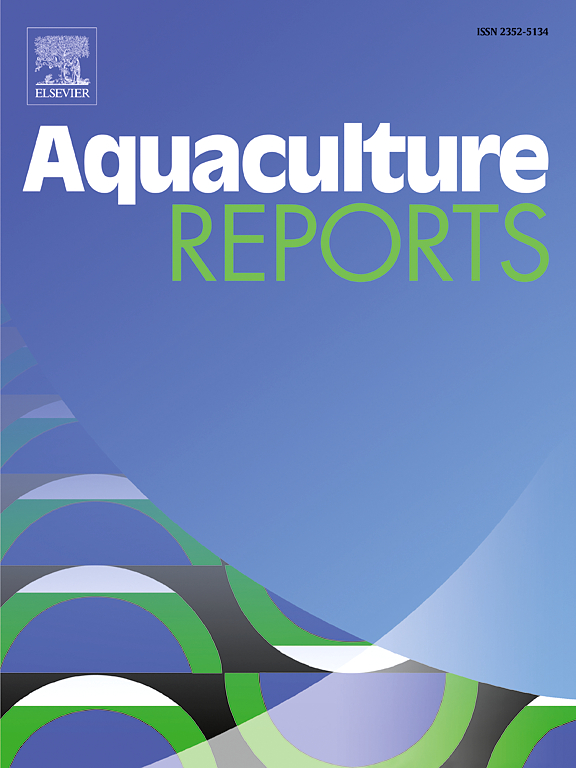凡纳滨对虾(Litopenaeus vannamei)饲料中甲烷营养菌粕替代饲料成分的研究
IF 3.7
2区 农林科学
Q1 FISHERIES
引用次数: 0
摘要
一项营养试验评估了细菌单细胞蛋白(BSCP)作为凡纳滨对虾(Litopenaeus vannamei)饲料中鱼粉(FM)的替代品。在27ºC条件下,试验了4种添加饲料替代量(0、25、50和75 %)的饲粮,分别添加0、40、80和120 g BSCP/kg饲料,共3个重复,持续139天。结果表明:饲粮替代比例为50% %时对白螯虾生长性能最佳,75% %时对白螯虾生长性能降低18.1% % (P <; 0.05)。各组间存活率、饲料表观转化率、全鱼近似生化组成、消化系统组织功能无显著差异(P >; 0.05)。高BSCP替代鱼粉(50 %和75 %)导致白对虾体中总n-3 PUFA和DHA水平降低(P <; 0.05),这可以通过在高BSCP饲料中增加鱼油水平来纠正。BSCP替代50%和75% %鱼粉对肠道菌群α多样性指数没有影响,但肠道菌群结构存在差异(P <; 0.05)。BSCP替代鱼粉75% %(120 g BSCP/kg)有增强白虾抗哈维氏弧菌感染能力的趋势,但这种趋势并不显著(P = 0.08),而BSCP可增强抗氧化应激酶的活性(P <; 0.05),说明BSCP可能具有超出标准营养终点的免疫调节作用。抗氧化应激酶活性的提高和肠道菌群的调节可能解释了饲喂较高BSCP水平的白对虾抗病能力增强的趋势。虽然需要在饲料中添加蛋氨酸和赖氨酸来实现氨基酸结构的平衡,但这些发现证实了BSCP作为虾饲料中FM的替代品的前景。本文章由计算机程序翻译,如有差异,请以英文原文为准。
Methanotrophic bacterial meal as an alternative feed ingredient for whiteleg shrimp (Litopenaeus vannamei) diets
A nutritional trial evaluated a bacterial single-cell protein (BSCP) as an alternative to fishmeal (FM) in whiteleg shrimp (Litopenaeus vannamei) diets. Four diets with increasing levels of FM replacement (0, 25, 50 and 75 %), which corresponded to an inclusion of 0, 40, 80 and 120 g BSCP/kg feed, were tested in triplicate for 139 days at 27 ºC. Results showed that up to 50 % FM substitution supported optimal whiteleg shrimp growth performance, whereas 75 % FM replacement reduced shrimp growth by 18.1 % (P < 0.05). No differences in terms of survival, apparent feed conversion ratio, whole-body proximate biochemical composition, and the organization and functionality of the digestive system were found among groups (P > 0.05). Higher FM replacement by BSCP (50 % and 75 %) resulted in decreased levels of total n-3 PUFA and DHA in whiteleg shrimp body contents (P < 0.05), which may be corrected by the increasing the levels of fish oil in diets with high levels of BSCP. Fishmeal replacement at 50 and 75 % by BSCP did not modify alpha diversity indices of gut microbiota, whereas gut bacterial community structures were different (P < 0.05). The replacement of FM by BSCP at 75 % (120 g BSCP/kg) tended to enhance disease resistance of whiteleg shrimp against V. harveyi infection, even though this trend was not significant (P = 0.08), while enhanced the activity of antioxidative stress enzymes (P < 0.05), which pointed out potential immunomodulatory effects of BSCP beyond standard nutritional endpoints. The improved activity of antioxidative stress enzymes coupled with the modulation of gut microbiota might explain the increase in disease resistance trend observed in whiteleg shrimp fed higher BSCP levels. While dietary supplementation with methionine and lysine is required to achieve a well-balanced amino acid profile, these findings confirm the promising role of BSCP as a alternative to FM in shrimp diets.
求助全文
通过发布文献求助,成功后即可免费获取论文全文。
去求助
来源期刊

Aquaculture Reports
Agricultural and Biological Sciences-Animal Science and Zoology
CiteScore
5.90
自引率
8.10%
发文量
469
审稿时长
77 days
期刊介绍:
Aquaculture Reports will publish original research papers and reviews documenting outstanding science with a regional context and focus, answering the need for high quality information on novel species, systems and regions in emerging areas of aquaculture research and development, such as integrated multi-trophic aquaculture, urban aquaculture, ornamental, unfed aquaculture, offshore aquaculture and others. Papers having industry research as priority and encompassing product development research or current industry practice are encouraged.
 求助内容:
求助内容: 应助结果提醒方式:
应助结果提醒方式:


